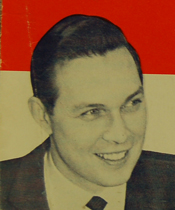Robert Kastenmeier facts for kids
Quick facts for kids
Robert Kastenmeier
|
|
|---|---|
 |
|
| Member of the U.S. House of Representatives from Wisconsin's 2nd district |
|
| In office January 3, 1959 – January 3, 1991 |
|
| Preceded by | Donald Edgar Tewes |
| Succeeded by | Scott L. Klug |
| Personal details | |
| Born |
Robert William Kastenmeier
January 24, 1924 Beaver Dam, Wisconsin |
| Died | March 20, 2015 (aged 91) Arlington, Virginia |
| Cause of death | Cardiovascular disease |
| Political party | Democratic |
| Spouse | Dorothy Chambers |
| Children |
|
| Alma mater |
|
| Profession | Lawyer |
| Military service | |
| Allegiance | |
| Branch/service | |
| Years of service | 1943–1946 |
| Rank | |
| Battles/wars | World War II
|
Robert William Kastenmeier (January 24, 1924 – March 20, 2015) was an American politician. He was a member of the Democratic Party. He represented central Wisconsin in the United States House of Representatives. He served for 32 years, from 1959 until 1991. He helped create important laws like the Copyright Act of 1976 and the Electronic Communications Privacy Act of 1986.
Early Life and Education
Robert Kastenmeier was born in Beaver Dam, Wisconsin. He went to public school there. After finishing high school, he joined the United States Army. This was during World War II.
Military Service in World War II
He was on his way to fight in the Pacific Ocean when the war ended in 1945. He left the Army in 1946 as a 1st Lieutenant. He stayed in the Philippines until 1948. There, he helped people with claims related to the war for the U.S. War Department.
College and Law School
After returning to the United States, he continued his studies. He went to Carleton College in Minnesota. Then, he studied law at the University of Wisconsin Law School. He earned his law degree in 1952. After becoming a lawyer, he started his own law practice in Watertown, Wisconsin.
Political Career in Congress
In 1955, Kastenmeier was elected as a justice of the peace. This was a local judge role for Jefferson and Dodge Counties. He served in this role until 1959.
First Elections to Congress
Kastenmeier first tried to become a member of Congress in 1956. He lost to a Republican, Donald Tewes. But in 1958, he ran against Tewes again and won! He became the first Democrat to win that seat in 28 years. He won against Tewes one more time in 1960. After a close election in 1962, he won easily in 1964. He was re-elected many more times, serving a total of 16 terms.
Views on War and Peace
As a congressman, Kastenmeier was careful about the U.S. getting involved in wars overseas. He was one of the first people to speak out against the Vietnam War in 1965.
Work on the Judiciary Committee
He was a member of the House Judiciary Committee for almost his entire time in Congress. This committee deals with laws and the justice system.
Role in Impeachment Proceedings
He played an important part in the process to remove President Richard Nixon from office. This is called impeachment. Kastenmeier believed that each reason for impeachment should be discussed and voted on separately.
Protecting Copyright and Privacy
From 1969, Kastenmeier led a special committee focused on courts and intellectual property. He was a main supporter of the Copyright Act of 1976. This law updated how creative works like books and music are protected in the U.S. It is still a very important law today.
He also worked for many years to improve privacy laws. He introduced many bills to protect people's privacy. This included privacy for phone calls, emails, financial information, and medical records. His efforts led to the Electronic Communications Privacy Act of 1986. This law made it harder for the government to listen to mobile phone calls and read electronic mail without permission.
Impeachment of a Judge
In 1986, Kastenmeier was chosen to help with the impeachment trial of a judge named Harry E. Claiborne. The judge had been found guilty of tax crimes but would not leave his job. Kastenmeier helped create the resolution that led to the judge being removed from office.
End of Congressional Career
In 1990, Kastenmeier unexpectedly lost his re-election to Scott Klug. Klug was a Republican and much younger than Kastenmeier. After leaving Congress, Kastenmeier worked briefly on a group that studied how to improve the justice system. Then he retired.
Legacy and Remembrance
Robert Kastenmeier lived in Sun Prairie, Wisconsin, and later in Arlington, Virginia. He passed away on March 20, 2015.
Words of Wisdom
A week before he died, he gave an interview. He warned about the U.S. getting involved in wars overseas. He said, "It's always very easy to get in, but terribly hard to get out." His friend, Congressman Dave Obey, said that Kastenmeier "never cast a vote for political reasons" and always voted based on his beliefs.
Honoring His Contributions
The federal courthouse in Madison, Wisconsin, is named the Robert W. Kastenmeier United States Courthouse. This honors his many years of service and his important work in law.
See also
 In Spanish: Robert Kastenmeier para niños
In Spanish: Robert Kastenmeier para niños
 | Aaron Henry |
 | T. R. M. Howard |
 | Jesse Jackson |

